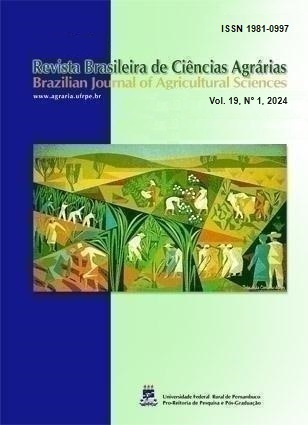Organomineral fertilization and salt stress on the agronomic performance of peanut crop
DOI:
https://doi.org/10.5039/agraria.v19i1a3478Keywords:
Arachis hypogaea L., plant nutrition, salinity, vegetables productionAbstract
Salt stress is one of the main abiotic stresses that negatively affect agricultural production and sustainable development worldwide. Thus, there is a search for management strategies to reduce the deleterious effects of salts on plants. In view of the above, the objective was to evaluate the effects of irrigation with brackish water and different forms of organo-mineral fertilization on the agronomic performance of the peanut crop. The study was conducted in a greenhouse in a completely randomized design (5 × 2 factorial scheme) with five forms of fertilization (F1 = 100% mineral; F2 = 100% bovine biofertilizer; F3 = 100% vegetal ash; F4 = 50% mineral + 50% bovine biofertilizer; and F5 = 50% mineral + 50% vegetal ash), two levels of electrical conductivity of the irrigation water (ECw) (1.0 and 5.0 dS m-1), and five replicates. The fertilization composed only by vegetable ash 100% associated with irrigation water with higher concentration of salts (5.0 dS m-1) caused negative effects on the number of pods, pod mass, pod shell dry mass and yield. Although brackish water (5.0 dS m-1) reduces peanut yield components and productivity, fertilization made with 100% biofertilizer provided the highest productivity among all treatments.



